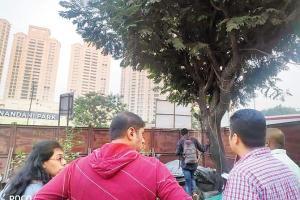Hatchlings from trees to be transplanted on line will be fostered, while eggs will be incubated; adult birds to be relocated on transplanted trees

Members of the team inspect a tree for nests
In a move that is being hailed by the nature and wildlife loving community, for the first time possibly in India, birds affected due to a development project will be relocated. Around 400 trees will be replanted for the Wadala-Thane-Kasarvadavli Mumbai Metro Line 4, and the hatchlings found in nests on them will be relocated to the trees transplanted in MMR, after they are fostered into adult birds. The eggs found in nests on the trees will be incubated and the adult birds will be relocated similarly.
ADVERTISEMENT
For the birds
A team of 10 people from the agencies involved in the project, the MMRDA, Metro, Tata, Reliance, the Thane Forest Department and RAWW, conducted a nine-hour survey on foot at Thane from Teen Haath Naka to Kasarvadavli, marking all trees that had nests on them, for the exercise recently. Speaking to mid-day, Pawan Sharma, president of NGO RAWW and Honorary Wildlife Warden of Thane, said, "This is a really good thing and to the best of my knowledge something like this is happening for the first time. We will shift those trees after waiting for some of the birds to grow up and fly away on their own, or send the sub-adults for fostering and rehabilitation, and the eggs for incubation if necessary."

Over 80 nests have been identified on the trees that will be transplanted
Nature lovers have welcomed the move and many are terming it a commendable attempt, because most development activities never focus on animal welfare or wildlife conservation. So they are glad to see that such efforts are being made to save birds. The team has identified over 80 nests and claimed that around 60 per cent of them are empty. Some are old, some are naturally damaged and some are abandoned. The remaining are to be verified after which necessary actions will be taken.
Sharma said they will take the help of avian experts and zoologists to ensure the plan is successful. "We have a Plan of Action (POA) in hand, with alternatives as well, to deal with this situation. We are taking the help of experts from our team at RAWW. Chinmay Joshi, a zoologist and a well-known rescuer and Dr Rina Dev, an expert avian and wildlife surgeon are on board along with the rescuers and volunteers from RAWW. The Thane SPCA's 24×7 emergency hospital facility is also with us,' said Sharma. The team has members with experience of more than a decade of treating, raising, rescuing and rehabilitating wild animals and dislocated wildlife.
Sincere efforts = positive results
Chinmay Joshi said, "The relocation of wildlife is an integral part of any development project. The Environment Impact Assessment report helps in understanding the flora and fauna, after which the compensatory action plan is put in place. It is a general scientific practice which must be exercised during every development project that leads to habitat loss and displacement of wildlife. Achieving 100 per cent success in what naturally occurs is next to impossible, but sincere dedicated efforts do help and show positive results."
Species spotted
Bulbul, Crow, Pigeon, Sparrow, Parakeet, Kite, Barbet and Myna
Catch up on all the latest Crime, National, International and Hatke news here. Also download the new mid-day Android and iOS apps to get latest updates
 Subscribe today by clicking the link and stay updated with the latest news!" Click here!
Subscribe today by clicking the link and stay updated with the latest news!" Click here!






